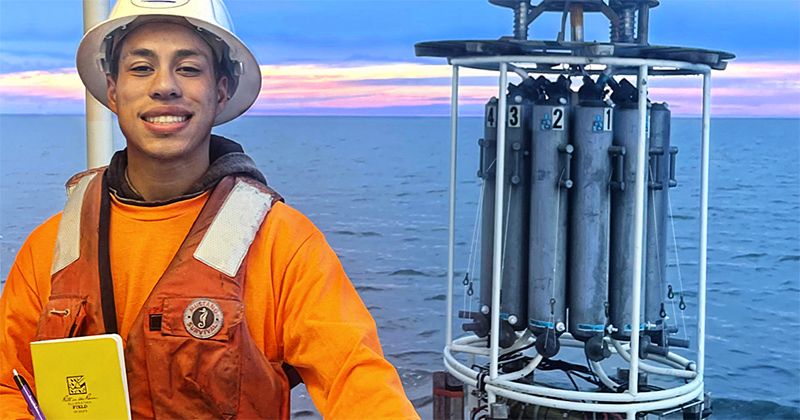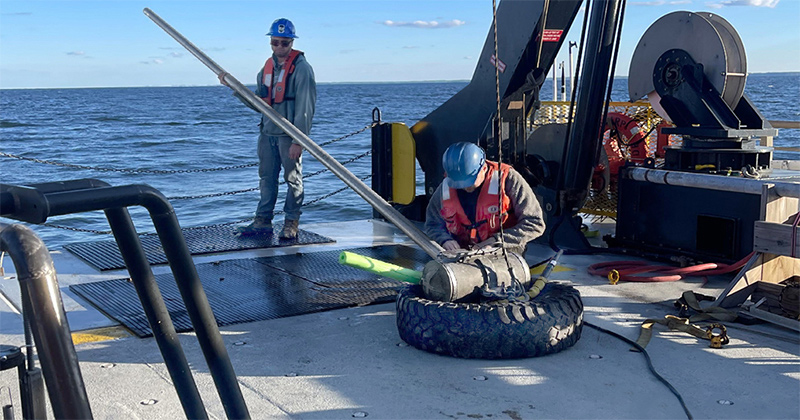


Science at sea
Photos courtesy of Jordan Rosales December 20, 2022
UD students participate in NSF-funded research cruise aboard UD-owned ship
During the 2022 fall semester, six University of Delaware undergraduate students as well as one student each from George Washington University, American University, and a recent Randolph College alumnus, conducted hands-on research on the open seas as part of the National Science Foundation’s STEM Student Experiences Aboard Ship (STEMSEAS) program.
The students departed from UD’s Hugh R. Sharp campus in Lewes and spent Oct. 15-22 aboard the R/V Hugh R. Sharp, collecting water samples to look for microplastics and taking core samples of sediment from the seafloor. The research cruise traveled through the Delaware and Chesapeake Bays as well as the Atlantic Ocean.
According to the STEMSEAS website, the program’s goal is to provide ship-based exploratory experiences for undergraduates from diverse backgrounds aboard the NSF-funded U.S. academic fleet of research vessels. Students sail with experienced faculty and graduate student mentors and engage in geoscience and oceanography activities.
Sue Ebanks, professor at Savannah State University in the Department of Marine and Environmental Sciences, Michael Toomey from the U.S. Geological Survey, and Savannah Geiger, who recently received her Master of Science degree in marine sciences from Savannah State University, served as the professional and graduate student mentors for the cruise participants. Geiger also served as the official Chief Scientist for the expedition.
Jonathan Cohen, associate professor in the School of Marine Science and Policy and the marine science undergraduate coordinator for UD’s College of Earth, Ocean and Environment (CEOE), said that the STEMSEAS research cruise afforded undergraduate students a unique research experience.
“Opportunities for undergraduates to experience science on oceanographic vessels are rare. Research cruises are expensive, and berths are limited,” said Cohen. “The STEMSEAS program provides undergraduates with the unique chance to be active participants in a cruise just for them. These sorts of immersive experiences have profound impacts on students, helping them find aspects of science they want to do more of and perhaps aspects they never want to do again. We were fortunate that this recent cruise was in our own backyard and took on some of our students.”
For Jordan Rosales, an Honors junior in CEOE majoring in geological sciences with a minor in coastal and marine geological sciences, the cruise allowed him to get experience with a variety of sampling equipment.
Rosales said that among the different tools he used during the cruise were a gravity corer — a corer that allows researchers to sample and study sediment layers from the seafloor — as well as a vibracorer, a multi-corer and a sediment grabber.
“I’ve learned about those instruments previously in my classes so being able to see them in person and be able to help set it up and talk about it was like a really good experience,” said Rosales.
As someone who has always been interested in rocks as well as the ocean, Rosales said the experience opened his eyes to how he can blend those two interests together for a future career.
“I feel like this experience has shaped me and made me want to look at going into the geology of marine science, rather than on-land geology,” said Rosales. “Getting the hands-on opportunity and seeing what a marine geologist actually does and seeing it firsthand, it completely changed everything. I feel like I made a good career choice and am interested in going to graduate school to continue to pursue it.”

Christina Martinez was the lone first-year student from UD on board and heard about the opportunity from an email that Cohen sent out to the undergraduate students. She said that it was a great opportunity to get research experience early in her academic journey, even if it was a bit unnerving to spend so much time out at sea.
“It was a little scary at first because I have never been on a boat for so long,” said Martinez. “I’ve done the New Jersey-Cape May ferry a bunch of times and small things like that but nothing like the [R/V Sharp].”
Martinez said that she enjoyed seeing how the Conductivity, Temperature and Depth (CTD) equipment was used to collect water samples for microplastic analysis, and that she enjoyed how the students got to conduct different research at the various stations set up during their journey.
“The stations they had us cycle through were really interesting, and there were always new sites to see, new conversations to be had about the research and new questions to be asked,” said Martinez.
In addition to the research aspect of the cruise, the students also have to keep up with homework in between conducting research at the various stations.
Martinez said during these moments in between or after the research was completed, it was great to get to know her fellow cruise participants — especially one night when they all decided to stargaze.
“We went to the bow of the Sharp, which is a pretty open place up there, and all of us just laid out on the bow, looked at stars and talked about different aspects of the trip,” said Martinez. “That was definitely my favorite part.”
One of the other cruise participants invited Martinez to Lewes to participate in a small business fair in December, where she will be able to display and sell her Otterly Knittable crocheted aquatic stuffed animals — a business venture she does in addition to being a student.
She said that those types of connections would not have formed had it not been for participating in the cruise.
“Being so young, I was surprised that they even accepted me,” said Martinez. “While it was nerve-wracking at first, once I got there, everybody was so nice and it was a very respectful community. I had no problem fitting right in.”
Students interested in sailing on a STEMSEAS expedition can apply online for the 2023 season at www.stemseas.com.
Contact Us
Have a UDaily story idea?
Contact us at ocm@udel.edu
Members of the press
Contact us at 302-831-NEWS or visit the Media Relations website

